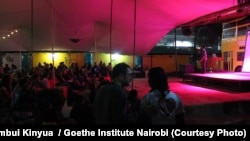Africa’s film industry is growing, but you can’t tell by looking in its movie theaters. Only a handful of African films make it on to the continent’s big screens. A new initiative aims to change that by bringing contemporary African films to African theaters and cultural centers.
On a typical Friday night in Abidjan, movie-goers will most often have to choose between American blockbusters or French comedies playing at one of the three movie theaters in town.
But on a recent night, the award-winning South African movie “Necktie Youth” was also being screened.
The black and white film is a raw tale of a tormented South African youth.
Bienvenu, an audience member, said he liked the movie.
“I liked the interracial friendships in it; it’s a good introduction to South Africa,” he said.
Bienvenu grew up in Kinshasa watching American and French movies. He said there were not many local movies.
“I can count on my fingers the number of Congolese movies I’ve seen. I want us to be open on the world, but I also want the promotion of African cinema. We have a lot of actors, a lot of movies, but little resources, no marketing. They are not known,” Bienvenu said.
To address the problem, South African producer Steven Markovitz created the African Screen Network, or ASN, earlier this year with financial help from Germany’s Goethe Institute. The platform aims to promote African films to African audiences and distribute more local content throughout the continent.
ASN manager Khanyo Mjamba explained that distribution can be difficult for reasons like a lack of funding or familiarity with a market.
“Some of the producers might not have the budget to distribute the film themselves, because say you are a distributor in South Africa, you might not be familiar with the landscape in Nigeria, and how to actually get your film in that market,” said Mjamba.
Currently, a selection of six award-winning movies from Kenya, Sudan, Ivory Coast and South Africa is being offered to theaters, who pay a screening fee that is split between the production companies and the ASN, said Mjamba.
“With some venues, especially the less-established screening venues, coming up with the screening fees may be a challenge,” he said.
But Mjamba added that most venues understand the need to offer African content, even if at this early stage, they benefit little financially.
Mjamba said they aim to showcase the best of African cinema.
“Films that filmmakers watch and be encouraged to say ‘Hey, I could actually make a movie like this, I could be daring and make a film that has never been done before,” said Mjamba.
So far, about 20 screens in 16 countries are organizing screenings. The ASN hopes to reach 30 by the end of the year.













